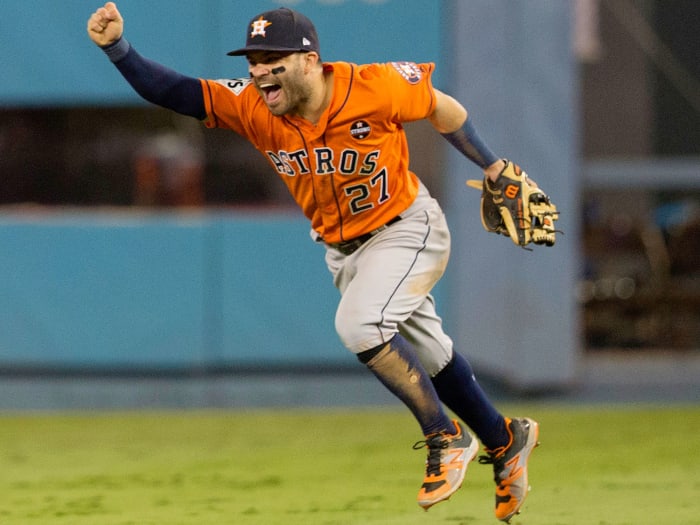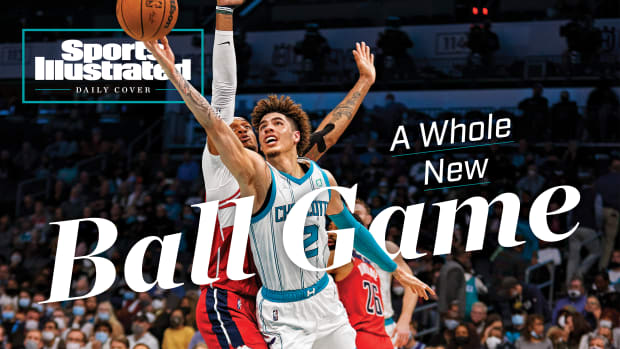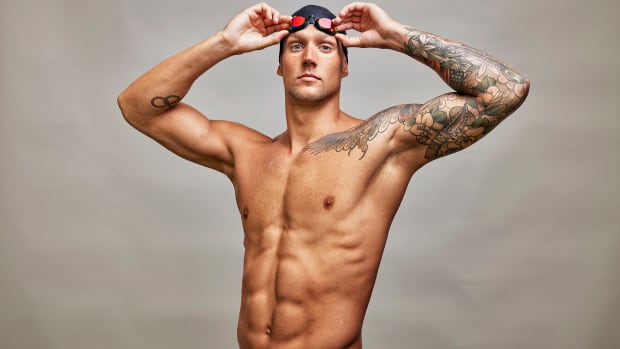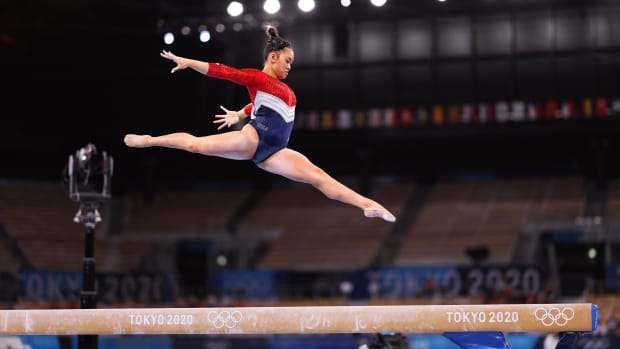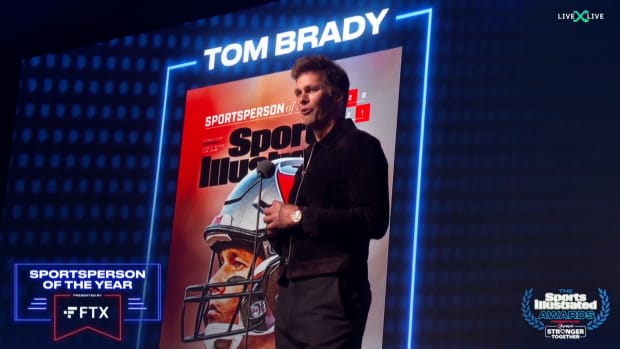SI’s 2017 Sportsperson of the Year: José Altuve Defied Odds to Bring Houston Hope … and a Title
The ancient Greeks may not have invented the concept of hero, but they get credit for naming it and giving it a face, not to mention a massive, strapping body. The Greek word heros referred to a protector or defender. Their embodiment of the concept was Heracles, the muscular demigod who would have been an NFL combine star had compression shorts and box jumps existed when he was busy cleaning out the Augean stables. A life-sized marble statue of Heracles at Los Angeles’s Getty Museum, dating to about 125 A.D. but inspired by 300 B.C. art, depicts the original hero as a ripped 6' 4".
Modern culture has diluted the concept of hero, particularly in sports, where some guy who happens to sink a couple of late free throws or kick a ball through goalposts acquires the appellation. Still, when it comes to our sporting heroes, the original bias toward size remains.
Over the past decade every one of the MVPs in the NFL and NBA stood at least 6' 1", with 18 of those 20 standing 6' 3" or taller. The most popular players in baseball, either by All-Star votes (Bryce Harper and Aaron Judge) or jersey sales (Judge, Kris Bryant, Anthony Rizzo, Clayton Kershaw and Harper), are at least 6' 3". We literally look up to them.
Then there’s José Altuve. This year belonged to him, in deed and in meaning, more than any other athlete. The Astros’ second baseman won the American League batting title and its MVP Award and led the 56-year-old franchise to its first World Series championship. Now he shares SI’s Sportsperson of the Year honor with 6' 5" Texans defensive end J.J. Watt, his Houston brother in charitable spirit. At 5' 6" and 165 pounds, Altuve is shorter than every male athlete to win the award except a jockey, Steve Cauthen, and a race car driver, Jackie Stewart.
Therein lies Altuve’s greatest accomplishment in 2017. He redefined what it means to be among the most heroic of athletes—a modern twist on Heracles. At 3.7 inches below average height, he does not have the classic physique fit for marble and the sculptor’s chisel. Watt outweighs him by 125 pounds. Indeed, when Altuve was 16 the Astros, the only team interested in signing him, told him not to bother to come back after just one day of tryouts at their Venezuelan academy.
SI's 2017 Sportsperson of the Year: He Isn't on the Field, but J.J. Watt Is Still Lifting Houston up
Sports become meaningful only when there is a bond between team and town that fortifies both. That bond for Altuve intensified on Sept. 1, the first day the Astros returned home after Hurricane Harvey hit southeast Texas. The greatest rainfall event in the history of the mainland U.S. dumped up to 60 inches over a four-day period, could end up costing close to $200 billion in damage and displaced more than 30,000 people from their homes, many of which were destroyed. About 10,000 of the displaced wound up downtown at the George R. Brown Convention Center, which was pressed into duty as a shelter. It is just two blocks from Minute Maid Park, the Astros’ home field.
With no game that day, Altuve, along with 15 teammates and staff members, visited the makeshift shelter. He wore a black T-shirt and gray pants. He had already pledged $30,000 to recovery efforts, and arranged for $25,000 worth of shoes from one of his sponsors to reach families in need.
Hurricane Harvey was nature’s cruel roulette wheel. Winning or losing was a matter of luck. Its torrents of rain and winds up to 130 mph spared some homes, such as the Altuves’, and ruined others. Moving among the unluckiest at the shelter and hearing their stories, as well as seeing information tables with signs taped to walls such as missing persons and free legal advice, Altuve felt a sense of purpose he hadn’t before, and this from a 27-year-old man who had fought his whole professional life to prove himself worthy.
“I saw a lot of people there who told me they lost their homes, lost everything they had,” he says. “I felt bad. But in the middle of all that disaster we were able to still see smiles on their faces. I said to myself, These people are going through a really tough time, and they’re still able to smile. And you’re able to give them hope. That’s what it’s all about: helping each other.
“The city of Houston has treated me really good since I got to the big leagues. And I felt that I owed them something. They made me the player I am by supporting me every day. So when they were having a hard time, I wanted to give something back to them.”
Deliver Us From Failure: How the Astros Endured Futility to Become World Series Champions
From that day forward, Altuve and the Astros were almost unbeatable at Minute Maid Park, where they went 18–3 after Harvey, including 8–1 in the playoffs. No team in any postseason ever won more games or hit more home runs (18) at home than the Astros. Nobody ever had more hits (17) or home runs (six) at home in one postseason than Altuve, who batted .472 at Minute Maid.
Says his double-play partner and close friend Carlos Correa, “That visit had an impact on all the players, but José, as he always does, took it to another level. He would always be saying to us, ‘The city is down right now, but we’ve got to pick it up. We’ve got to play well and maybe go all the way. It would be a beautiful story to get people back on their feet.’ ”
"The city of Houston has treated me really good since I got to the big leagues," says Altuve, "and I felt that I owed them something."
The Astros’ run was reminiscent of the 2001 Yankees’ reaching the seventh game of the World Series as the remains of the Twin Towers smoldered, and the ’13 Red Sox winning the Series bearing Boston’s heartache over the marathon bombing. Meaning beyond outcome became palpable in the full-throated roars and cathartic delight that rose under the roof at Minute Maid.
“It was something different, before and after the hurricane,” says Altuve. “The Houston fans have been great all the time. Before the hurricane they were supporting us while we were playing, but after you felt like they were there for each other and for us at the same time. I don’t know how to explain it, but it was a great feeling.”
No sport can close the wound of such devastation. But no sport can provide a better salve than baseball. Its restorative properties are bound in its ubiquity: Baseball is there every day (or darn near close), which gives it a reliability and normalcy that become especially valuable in disruptive times. It also provides a conveyor belt of hope. Don’t like today? Tomorrow, bearing another game, can be better, or maybe the one after that. One day at a time.
*****
For two months the Astros expanded upon the civic role they played at the Brown Convention Center, this time with their bats and gloves. They couldn’t replace a flooded home, but they could bring cheer at a time when that emotion was all too scarce. Hope grew with each win, even if many people had to watch the games with their soaked belongings piled curbside. A diversion became a dream come true for a city that had gone more than half a century waiting for a World Series championship. At that point only Indians fans were enduring a longer streak of titleless seasons.
In the worst of times, from 2011 to ’13, the Astros lost 106, 107 and 111 games. They were so bad and so irrelevant that a game in 2014 received a 0.0 local rating, which means the folks at Nielsen could not prove that a single person in Houston watched the Astros lose 9–1 to the Angels.
Three years later, at precisely 10:57 p.m. CST on Nov. 1, more than three out of every four television sets turned on in the Houston area were tuned to the Astros—a community of 2.4 million believers restored in spirit by the day-to-day achievements of a baseball team. The last out of the World Series, a ground ball off the bat of Dodgers shortstop Corey Seager, bounced to—where else?—the outstretched glove of Altuve.
“How appropriate,” said Houston manager A.J. Hinch. “He deserves to be forever in the last highlight of the first world championship in Houston Astros history.” The season ended in the right hands not only because Altuve endured all three of those 100-loss seasons—his first three in the big leagues—or because he was the soon-to-be-named MVP. But it also was because he was the right kind of sports hero at the right time: a relatable one.
This is someone who told the Astros he would sign for free, and gladly accepted $15,000. Who gained 38 pounds in his first four years in America. (“Burgers and ice cream—a lot!”) Who before every game, home and road, walks to the stands to sign autographs for kids. Who has a size-9 shoe and a XXXL heart.
But mostly that relatability comes from being the smallest player in baseball. While we marvel at the amazing skills of those bigger, swifter and stronger than us, Altuve is not just inspirational but also aspirational, a 5' 6" superconcentrated formula of willpower. We can achieve because Altuve can achieve, despite being as short as Napoleon Bonaparte (without the eponymous complex) and shorter than four of the starters on the 2017 Little League champions, from Lufkin, Texas.
“A lot of people tell me now I’m their inspiration,” Altuve says. “They say, ‘I don’t play baseball,’ and then they mention whatever—engineer, doctor, college student, high school student—but they’re hurt, because for some reason people feel shame about themselves or embarrassed because they are short or skinny or fat or whatever. That was something I never had in me. I was short, but I was O.K. with it. I didn’t care. I still don’t care.”
*****
YOUR 2018 CHAMPS: Why the Astros Will Repeat Next Season as World Series Champions
Presidents (Martin Van Buren, Benjamin Harrison), musicians (James Brown, Willie Nelson), songwriters (Cole Porter, Ira Gershwin), filmmakers (George Lucas, Spike Lee) and world leaders (Winston Churchill, Alexander the Great) are among the many renowned men who have stood 5' 6". But male athletes of that height—jockeys aside—rarely get leading-man notice. Altuve’s stature actually leaves his freakish baseball skills underappreciated. Were he 6' 6" and 245 pounds, like National League MVP Giancarlo Stanton, or 6' 7" and 282 pounds, like AL MVP runner-up Judge, we would pay more homage to the physical wonders of Altuve. He plays a frenetic, caffeinated style of baseball. He is a body in constant motion, even in the usual repose between pitches in the batters’ box, when he is a bundle of tics and fits that make visible his eagerness to do what he loves best: hit.
Watching Altuve at bat is like watching a gymnast spinning and dismounting off the uneven bars and sticking the landing, or in this case, squaring up the baseball. It’s a symphony of precision and violent speed.
“His body control is spectacular,” Hinch says. “It allows him to cover any area on any pitch, but especially the high fastball. His bat speed is probably within an abnormally high range, and when he swings he gets the bat where he needs to get it on time.”
A fast story: Altuve faced Yankees reliever Chad Green in Game 1 of the AL Championship Series. Green threw the most difficult four-seam fastball in the league last season; batters hit just .109 against it. Altuve had seen Green only once in his career. He promptly whacked a 97.2-mph high heater from Green into leftfield for a single.
The next night Altuve faced Aroldis Chapman, who throws the hardest fastball (100.0 mph) in the AL. Altuve, batting in the ninth inning of a tie game, smashed one of those 100-mph bullets to left for a single, then scored on a walk-off double by Correa, sliding home gleefully on the seat of his pants like a kid on a metal saucer down a snowy hill.
The Yankees got the message. For the rest of the series, covering 21 plate appearances, they dared throw him only 15 more four-seam fastballs—just seven in the strike zone.
Altuve devours fastballs. The harder they come in, the more he feasts on them. The average big league heater is 92.3 mph. The major league batting average on above-average fastballs (94 and above) is .254. Altuve hit .432 against them, including an astounding .529 in the postseason. Nobody in baseball was within 31 points of his mastery of velocity.
“I kept listening in the minor leagues, and even earlier than that,” he explains, “people would say, ‘If you don’t hit the fastball, you’re not going to get to the big leagues.’ Every game you’re going to get a fastball. I haven’t seen a guy that throws 20 breaking balls out of 20 pitches. One or two of those are going to be a fastball. And you have to be ready to hit it.”
Here’s the real difficulty of pitching to Altuve: He batted .350 against fastballs, but he also hit .337 against off-speed pitches, making him the only player in baseball among the top 10 in both categories. Pitchers facing him must choose between the arsenic or the hemlock. He hit .344 against righthanded pitchers and .353 against lefthanders; .347 in the first half, .344 in the second; .338 versus starters, .363 versus relievers; .342 with the bases empty, .350 with runners on.
An inside story: Altuve, Correa and leftfielder Marwin González sat around the clubhouse after a win in Minnesota on May 29. Altuve was hitting .308, Correa was hitting .311 and González was hitting .311. So Altuve came up with an idea.
“Guys, let’s have a friendly wager,” he said. “First one who gets to .320, the other two guys each have to buy him a pair of shoes of his liking.”
“No way!” Correa exclaimed.
“Why not?” Altuve said innocently.
“Because I’ve never hit .320, and you hit .340 every year. It’s got to be something I can compete with you on if shoes are involved.”
The next day Altuve went 4 for 5, raising his average to .320.
“Marwin and I just looked at each other like, ‘Really?’ ” Correa said. “He’s amazing.
“The thing about José is that he always likes to try a new thing. It’s almost like he gets bored getting hit after hit. He hit .485 in July. And then it was like he wanted to try something new. Sometimes he’ll try something to see if he hits more homers. Maybe it’s a small leg kick, or a big leg kick. It could be his approach—looking for a particular pitch, for instance. And he’s constantly picking up bats from other guys and using them—me, [centerfielder George] Springer, anybody.
“That’s the only time he struggles. And then he just goes back to getting his hits.”
Now fold in that Altuve hits for average and power—swinging a bat that’s half as big as he is—and he is even more of an extreme outlier. There have been some 19,000 major league players. Only two of them 5' 6" or shorter ever had 1,000 hits and 75 homers: Altuve and Hall of Famer Hack Wilson, who was born in 1900.
*****
The story: The Astros initially decided Altuve was too short to be a pro ballplayer. It’s the definitive Altuve story—his pluck writ small.
It was September 2006. The Astros invited Altuve, then 16, to a tryout at their academy in Venezuela. He stood 5' 5 1⁄2" and weighed 140 pounds. The 50 or so players were told afterward that about 20 of them would be invited back the next day; they would be notified by a phone call. No call meant no interest. Altuve went home. The phone never rang.
How to Buy Every Astros Sports Illustrated Cover Since 1981
Altuve’s father, Carlos, an engineers’ assistant at a chemical plant, asked him if Al Pedrique was one of the decision makers at the tryout. The Venezuelan-born Pedrique was a special assistant to Houston’s GM then, Tim Purpura. Carlos knew Pedrique held sway at the Venezuelan academy. As it turned out, Pedrique was in the Dominican Republic and was due in the next day.
“You go back there tomorrow,” Carlos said, “so Pedrique can see you.”
Asked if he would have returned without his father’s prodding, Altuve says, “No.”
Uninvited, Altuve returned to the academy. The Astros let him stay. On this day, unlike the first, the players would face live pitching.
“I remember this guy, a big prospect, was on the mound—a big lefty throwing gas,” Altuve says. “I was like, He’s going to throw you a first-pitch fastball. If you don’t hit it, you’re done.
“I went in there and hit a hard line drive to centerfield. I hit the next pitch and a couple of other good ones, and then they were like, O.K., he can hit live pitching.”
After a few days, and with Pedrique’s blessing, the Astros signed Altuve. Omar Lopez, the manager of their Venezuelan summer-league team, told José he would like to speak with his mother and father to negotiate a signing bonus.
“Signing bonus?” Altuve said. “Just give me a contract. I’ll sign for free.”
The $15,000 they gave him was laughably small for Venezuelan free agents. Future Royals catcher Salvador Pérez, Altuve’s friend since they were seven years old, signed around the same time for $65,000. The Yankees gave another catcher, future big league bust Jesús Montero, $1.6 million.
Putting up with hecklers who rode him about his height, getting thick on American food, and insisting that he room with English-speaking teammates to learn the language, Altuve proved enough people wrong in the minors to reach the big leagues in 2011. He hit .276, .290 and .283 in those first three years, after which his father said, “I think you can hit .320.”
“I was like, I don’t know if I can hit .320, but I might get to .300,” José says.
He overhauled his diet that winter, swearing off the burgers and ice cream, and dropped from 178 pounds to 160. He finished at .341, winning the first of his three batting titles. It also marked the first of four consecutive 200-hit seasons. He is only the fourth righthanded hitter to accomplish that—and the first player ever to lead the majors outright in hits for four straight years.
Two hundred hits has become his personal benchmark. Says Correa, “The most impressive thing is he’s never complacent. If he’s 3 for 4, he wants to go home 4 for 5 or else he won’t be happy.”
A quick story: Altuve needed three hits on the last day of the 2015 season to reach 200. He had two knocks in four at bats when he came to the plate in the ninth inning against Diamondbacks reliever Brad Ziegler. The count went to 2 and 2.
“Last pitch, last out, last inning, last strike,” Altuve says. “It was crazy. I closed my eyes, and I said, God, whatever you want to happen will happen. If it’s a hit, it’s a hit. If it’s not, it’s not. I opened my eyes, got ready, and got a hit—a ground ball in the hole between first base and second base.”
Altuve has more 200-hit seasons than all other players 5' 6" and under combined in the past hundred years. “Sometimes,” says Houston hitting coach Dave Hudgens, “I swear he’s the one guy who can will himself to get a hit.”
“When we flew home, I looked out the window of the plane and couldn’t believe it," Altuve says. "The city was destroyed. From the plane you could see houses and water all over the place."
*****
"How long do I have to play like this?”
It was a simple question from Altuve to Hinch before the Astros played a game in Anaheim at the end of August. Hurricane Harvey had formed and was bearing down on Houston. Altuve’s wife, Nina, was with him on the trip, but the couple had left their 10-month-old daughter, Melanie, at home with José’s mother and father. The danger and the uncertainty tore at Altuve, especially knowing that instead of returning home after the series against the Angels, the Astros would fly to Florida to play their relocated home games in St. Petersburg.
“We didn’t have any idea how long it was going to last and how we were going to handle it,” Altuve says. “They told me, ‘Whatever you want to do. Do you want to take your family out of the city? Do you want to helicopter them out?’ They told me whatever they do they will do not only for my family, but those of all my teammates.
“My family was O.K., but I kept listening to people saying, ‘It’s going to get worse. It’s going to get worse.’ That’s what freaked me out. It’s not easy to go out there and play and be focused on the hurricane and the people of Houston and my family. I decided to keep my family there. My mom and dad said [Melanie’s] going to be safer at home. I was like, ‘O.K., I trust you guys.’
“When we flew home, I looked out the window of the plane and couldn’t believe it. The city was destroyed. From the plane you could see houses and water all over the place. It was bad.”
The Astros’ postseason began on Oct. 5 at Minute Maid Park with the Division Series against Boston. Before the game Louisiana’s Cajun Navy, an ad-hoc group of private boat owners who ran their own volunteer rescue operation, presented the city with a Houston Strong flag that would fly throughout the postseason. Hinch was eager to see how Altuve would respond to his second crack at postseason play.
A leading story: After the Astros lost Game 5 of the 2015 ALDS to the Royals, before Hinch could address his team upon the season-ending defeat, Altuve, still in uniform and near tears, was in the manager’s office apologizing.
“I was like, Hey, I didn’t play really good in this playoff, but that was everything I had,” recalls Altuve, who had hit .154.
Says Hinch, “I felt it was my job to tell him he was the reason we were there. There was great pride in him. It was the first time he experienced winning in the big leagues. I knew how much it meant to him.
“At that moment, I felt like I had the perfect player on my team: Someone who deflects the praise but accepts the blame. I didn’t want him to carry the burden. [This fall], as we got ready to play Boston, I wondered if he would carry 2015 into the postseason.”
The answer? Altuve hit three home runs in Game 1.
So clutch was Altuve in the playoffs that when asked about his biggest hit he started down a cascade of memories, beginning with the three-run homer he hit off Kenta Maeda to tie World Series Game 5.
“Probably that one,” he said. “Well, I got one hit against [Luis] Severino, [ALCS] Game 6, down 3–2 in [the series] and I hit a two-run single. . . . but then I hit a go-ahead home run in [World Series] Game 2. . . . The single in the [ALCS] walk-off game, that was a good one, too. . . . In [World Series] Game 7 when I hit a ground ball to first base for an RBI, I celebrated like I hit a home run. Wow. . . .”
• A look back at every previous SI Sportsperson of the Year cover
One more story: On the field at Minute Maid Park after ALCS Game 6, in which ace Justin Verlander pitched seven shutout innings to stave off elimination, Altuve, never more boyishly excited, said during a live interview on Fox, “I literally love Justin Verlander.” His enthusiasm and word choice sparked a meme.
The next night, immediately after Houston beat the Yankees to win the pennant, the players gathered in the clubhouse in front of tubs packed with champagne. Altuve was the one to speak.
“I just wanted to let you guys know,” he said, pausing for a beat, “that I literally love every one of you! Now let’s go win this thing!”
Only then did they pop the corks.
“He’s as confident as he appears to be, but he’s never comfortable,” Hinch said. “What I mean by that is, the drive and the right amount of awareness of what he has to do to be successful never wavers. Most of us would probably bask in the glory of having his bat-to-ball skills or his success rate. This guy is as hungry as he is respectful of what it takes.”
The Astros followed their leader through one more round, finishing a trifecta of knocking off the teams with the biggest payrolls in ascending order: the Red Sox, Yankees and Dodgers, icing on the cake for an underdog like Altuve.
In the next few weeks he rode in the championship parade, appeared on The Tonight Show and Saturday Night Live, was voted MVP and signed autographs at a sporting goods store in Katy, Texas, an event that drew a line around the building that began with people camping out 36 hours in advance. Two weeks ago, just 26 days after he fielded the last out of the World Series, he was back in the gym near his Miami-area home. Out of uniform, in a gray short-sleeve hoodie and shorts, Altuve looks even smaller. You stand next to him and realize where most of his power must come from: within. This is even more apparent when, in serious tones, he talks about his first day back to full workouts.
“I’m happy and all that,” he says of earning the franchise’s first title, “but I feel like, ‘O.K., we have to move forward, and next year is another year.’ I mean, we are World Series champions forever. Everybody knows that. But I want to win multiple World Series.”
Never too short nor too satisfied, he constantly proves others wrong and Isaac Newton, another 5' 6" success, right: A body in motion remains in motion. With Altuve, there is always another story.


